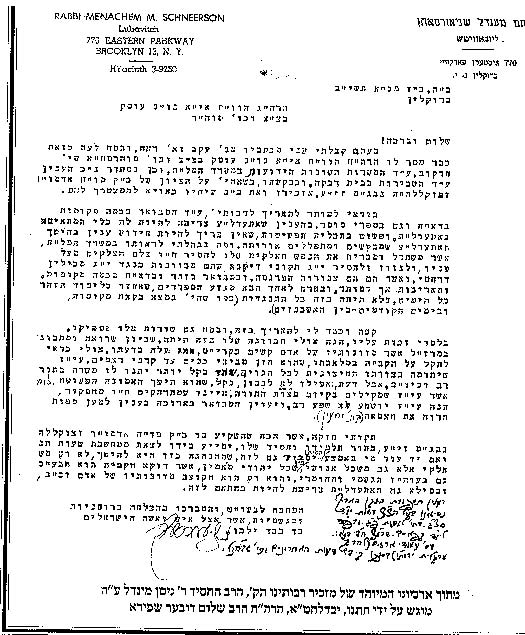
Weekly Letter: Being Ridiculed for a Beard
In this weeks letter, The Rebbe responds to person lamenting his being ridiculed for his meticulous observance of Torah and Mitzvos, specifically his growing of his beard. The letter, written originally in English, is from the archives of the Rebbe’s trusted secretary Rabbi Nissan Mindel.
By the Grace of G-d
6th of Shevat, 5726
Brooklyn, N.Y.
Mr.
Cleveland Hts., Ohio
I am in receipt of your recent letter in which you write that some people around you ridicule you for your conduct in your meticulous observance of the Torah and mitzvos and especially in regard to your growing a beard.
It is surely unnecessary to emphasize to you – and you may convey this to those who ridicule you – that the beginning of all four sections of the Shulcha Aruch (and in Torah a beginning is very significant, for the order of things in Torah is also Torah, meaning “instruction”) “Don’t feel ashamed in the face of those who ridicule you.” ולא יתבייש מפני המלעיגים””
The above is both a commandment as well as a source of strength, to be able to ignore the thoughtless and foolish conduct of people who have no respect for the religious convictions of others. Moreover, this also forewarns the Jew who is resolved to advance in matters of Torah and mitzvos that he is likely to meet such people who would ridicule him. Therefore he should not be surprised or discouraged, because the yetzer hora is always determined to fulfill his function of interfering with and discouraging a Jew in his efforts to advance in yiras Shomayim and always uses appropriate tricks. Were the yetzer hora to attempt to influence you through the agency of a goy and offer you arguments to act contrary to the Shulchan Aruch, he would not get to “first base” with you. So he appears in the guise of a Jew , who does not seem to realize that he is acting as a vehicle for the yetzer hora and attempts to influence you in that way. One can only pity those who lend themselves as agents of the yetzer hora, to discourage another Jew in matters of yiras Shomayim.
As for the question of wearing a beard, even those who think that according to some Poskim it is permissible to shave a beard in a certain kosher manner, do not seem to remember that those very Poskim themselves grew beards and exerted every effort to see to it that their children would also grow beards, knowing that our Sages have declared that a beard, insofar as a Jew is concerned, reflects the “Tzelem Elokim.” Thus, those who make fun of a Jew growing a beard, are making fun of the “Tzelem Elokim.”
And now to your second question, relating to the nusach of prayer. You write that you have been told that in view of the fact that your parents and ancestors have davened in another nusach, you are obligated to follow the same nusach. The simple answer is: If this were a true approach, how is it possible that there should be a Nusach Ari in the first place, and that it should have spread so far and wide, because the Ari HaKadosh did not fix this nusach for himself alone.
I am aware of the old and worn out question: if this nusach and this conduct is so important and necessary, what happened before it had been revealed? If this were a valid question, it would also apply to all matters of Torah which have been revealed from time to time over the ages. Thus you could ask what happened before the Remo made his additions to the Mechaber, or what about all those dinim which were enacted during the time of the Amoroim, in addition to those of the Tano’im who preceded them? You may also ask the same question about the mitzvos of eiruvin, or the mitzvah of netilas yoda’im which, according to the Gemorra, were enacted during the days of Shlomo Hamelech , but were previously not part of the body of dinim, but since Shlomo Hamelech they have the authority of Divrei Sofrim , about which the Gemorro says that one who transgresses Divrei Sofrim is chayov miso. Moreover, there are even mitzvos min HaTorah which, though they were all given at Mount Sinai on the sixth of Sivan in the year 2448 after Creation, were actually enforced in stages during the forty years of wondering in the desert, and the mitzvah of hakhel was given at the end of this period, according to the pshat of Chumash.
The truth is, as our Sages say, “All that a pious disciple of Torah was destined to reveal throughout the ages, was already given to Moshe at Sinai,” but for reasons best known to hashgocho protis, they were revealed at a certain time in Jewish history.
It is certainly unnecessary to elaborate on the above.
With blessing,
By
***
The above letter is from The Letter and the Spirit by Nissan Mindel Publications (NMP).
These letters were written originally in English and were prepared for publication by Rabbi Dr. Nissan Mindel, whose responsibility it was the Rebbe’s correspondence in English and several other languages.
We thank Rabbi Shalom Ber Schapiro, who was entrusted by his father-in-law Rabbi Mindel with his archives and who is Director of the Nissan Mindel Publications (NMP), for making the Rebbe’s letters available to the wider public. May the merit of the many stand him in good stead.















